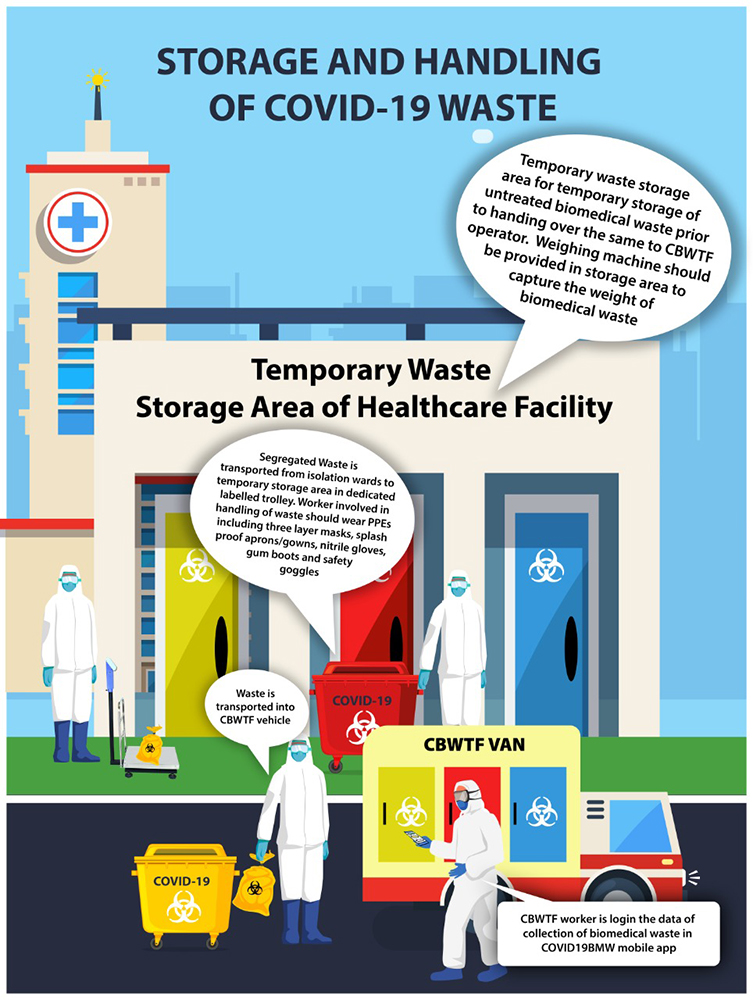The Corona pandemic has compelled most countries to require its citizens to use personal protective equipment (PPE) such as masks, gloves, protective wear, body bags etc. as a first line of defence against this highly contagious disease, to protect them from contacting the virus and prevent them from transmitting. While the PPEs are extremely essential for the health and wellbeing of frontline COVID-19 warriors like doctors, paramedics, healthcare professionals, sanitation workers, security and law and order professionals the waste created after use of these lifesaving PPEs is becoming a life threatening risk for other cohabitants of our planet.
Most of these PPEs are made up of plastic. There is indiscriminate and unregularized disposal of used PPEs like disposable masks and latex gloves which have been found to be floating in the water bodies, oceans or scattered across beaches – which are already choking under the weight of plastic waste that threatens marine life. Environmental campaigners rightly fear this as just the tip of a looming iceberg. Since the pandemic has spread in India, a lot of them have ended up in already overflowing landfills, posing a health risk to waste pickers, sanitation workers and garbage collectors tasked with handling them. The coronavirus pandemic has created a new waste crisis.
India has a comprehensive legal framework and rules to handle different types of waste including biomedical waste. The rules clearly mention the SOP for handling this waste right from identification, collection, transportation and to scientific disposal, that would ensure the waste has none or minimal impact on the environment. All these regulations undergo revisions to address new developments or to handle specific situations like the COVID-19.
New norms for the proper disposal of the PPE with detailed guidelines on what to do with COVID related waste generated by designated sites such as hospitals, laboratories, quarantine centers, containment zones and isolation facilities were released by The Central Pollution Control Board (CPCB), the country’s apex body on the regulation of waste disposal, as early as late March / early April. Given the contagious nature of the disease, the CPCB had decided that in addition to the Biomedical Waste Management Rules, the disposal of PPEs required a set of specific norms, including the method of collection, packaging for transport e.g. a double layer of packing to avoid leakage, and scientific disposal.
Accordingly, used masks, tissues, head covers, shoe covers, disposable linen gowns, non-plastic and semi plastic coveralls are to be disposed of in a yellow bag meant for incineration at a common biomedical waste treatment facility (CBWTF). So is the case with leftover food, disposable plates, glasses, used masks, tissues and toiletries of Covid-19 patients. It has also been stipulated that those in home isolation, in containment zones, should deposit biomedical waste generated from suspected or recovered Covid-19 patients in yellow bags to authorized waste collectors, engaged by urban local bodies, or at designated centres or hand over these bags to CBWTF operators. The National Green Tribunal had also urged the state pollution control boards and pollution control committees to take steps to mitigate the possible risk of unscientific disposal of the bio-medical waste.

As mentioned earlier, India’s regulatory framework is comprehensive and well developed, with separate set of rules addressing different types of waste. However, as has been the issue over many years, the effectiveness of these robust regulations diminishes to a great extent due to poor implementation on ground. Although we have seen improvement in this in recent years, there is still a long way to go.
As per data available with CPCB, India has around 200 Common Bio-medical Waste Treatment and Disposal Facilities (CBWTDFs) and over 12000 captive treatment and disposal facilities. About 600 MT of Biomedical waste is estimated to be generated every day in the country, of which about 525 MT is scientifically treated and disposed through the available facilities. Around 15% gets unscientifically disposed in landfills contaminating the environment and causing public health hazards.
The data available with regulatory authorities like CPCB or MPCB indicate that the disposal facilities to handle biomedical waste in metros like Delhi and Mumbai are already running at 75% utilization capacities. With the advent of the COVID crisis hitting India and exponential increase in the generation of biomedical waste, the capacity availability will further drastically reduce, that may generate a situation of more biomedical waste being unscientifically disposed, especially from residents and small generators, leading to further impact on environmental and public health and hygiene.
Threat to Sanitation Workers
Along with the PPEs Solid Waste handling, it is also pertinent to acknowledge the threat this situation has caused to the sanitation workers and persons operating the Sewage Treatment Plants (STPs), especially for facilities serving the COVID-19 infected people. The virus can transmit through liquid and soiled waste generated from infected persons and end up in the STPs. It is also pertinent that government bodies and private institutes ensure their STPs are operated in the pandemic lockdown situation too as per the set procedures without cutting corners to confirm complete breakdown of biological pollution and that the treated water is adequately filtered and disinfected before either reuse or release into the environment. Untreated or partially treated wastewater may otherwise end up in water bodies or contaminate the land and in turn, ground water source, where proper drainage and treatment facilities are not available.
The country has the technological knowhow and the requisite knowledge for handling this waste problem. What needs strengthening is making the correct information easily available – regarding what needs to be done with this waste at every stage and the end mile collection connectivity facilitation to ensure that the generator has an easy solution for disposal. The lack of collection facility needs augmentation through appropriate ecosystem development along with competency development of collectors and sanitation workers, by providing them appropriate training considering the risk inherent in handling biomedical waste.
Sensitization of community at large on the risks of unsegregated disposal of biomedical waste has gained utmost importance now especially due to the pandemic and the contagious nature of the disease. The need of the hour is continuous, relentless outreach and awareness programs by administration, roping in non-governmental social enterprises for public and utilizing all the mediums of communication on this important topic.
While it’s too early to assess the total impact of the biomedical waste generated in India during COVID-19, one thing is certain, the implications of our actions today will definitely impact our tomorrow and for years degrade our ecosystems, oceans and for each one of us by possibly ending up on our platter of food in the form of microplastics!







